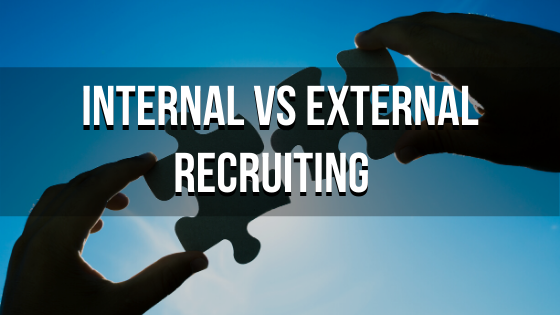
No hiring choice is black and white, there are always options to be weighed. But making the decision to promote from within or recruit externally can feel like a particularly knotty choice. Both options have their merits. But does one make for sounder hiring practices than the other?
Let’s weigh the pros and cons to figure it out
PROMOTING INTERNALLY: The Pros
A Powerful Promise
The promise that your company offers the possibility of internal mobility can be a powerful recruiting tool. It signals to candidates that you are invested in your team and that you have thought about their futures. Employees feel that they have a possible roadmap for growth, which in turn encourages greater loyalty. Ultimately it can enhance your retention rate quite a bit.
Ease the Transition.
Current employees already are familiar with your company culture. They know the rules, the policies and the inner workings of the business. Induction time is erased or greatly reduced, and the hire can get right down to work. Your business saves time, energy and money that would otherwise be expended on onboarding. Those valuable resources can be redirected toward the creation of new positions or saved for another time.
Moral Booster
The promise of promotion boots moral and keeps energy up in the office. When employees know there is an opening, they’ll hone their production and work hard to earn a spot on the next level.
The Bottom Line.
Finally, promoting from within your business is far less costly. You’ll save on recruiter fees, background checks, and advertising. Money in your pocket.
Sounds like a no brainer, right? Well, hold on, here comes the other side of the coin.
PROMOTING INTERNALLY: The Cons
Conflicts Abound
Opening up an internal search might energize your employees, but what happens to the candidates who don’t get the new job? Any responsible and well-executed internal search is going to include complete vetting of the candidates. The process can easily lead to increased dissatisfaction and eventual resignations. It’s one thing to interview for a position at a new firm and not get it, but it’s quite another thing to be turned down by your current employer for a promotion. These are employees who have already gotten a taste of the possibility, if you can’t fulfill it, they’ll look elsewhere.
Skeletons Have Legs
Everyone makes mistakes -- it’s what helps us grow. But some mistakes are hard to live down or move past within the company. The story of how Tim tripped at a luncheon and spilled a cup of coffee in the CFO’s lap, the time Phil blew the sales luncheon because he was fighting a stomach bug. These stories have legs, and like other skeletons in our closets, that have a habit of following us around. Stories linger, and so do reputations -- it may be hard for your other employees to see their peer in a new light.
Stagnation
There’s something to be said for being too familiar with company culture, being too close to what goes on. When you move someone new into a management position you’re putting them there because of the ideas and the energy they bring. It’s hard to push innovation when someone is too familiar, or too comfortable with how things have always been.
Bad Habits Can’t Be Promoted Away
Just as it would be incredibly unwise to marry someone in the hopes that their bad habits will magically change after the wedding, so too you can’t promote bad habits away. More responsibility will only enhance weaknesses and shine a spotlight on difficulties.
EXTERNAL HIRE: The Pros
Fresh Perspective
Businesses grow and prosper when the spirit of innovation is encouraged and the limits of imagination are pushed. Getting a fresh pair of eyes on your business is one of the best ways to get ideas flowing and energy moving. Bringing in an outside hire is one of the best ways to infuse your department or company as a whole with new ideas.
Pick From the Best In The Business
When you contract with an outside recruiter, they are looking not only at people who are already in the job market, but also talent who haven’t thought about making a move yet. Through their connections and networks, recruiters pre-screen for the best and most qualified talent, bringing you a wealth of talented people who might not otherwise have been attracted to your job opening.
Create Diversity
Recruiting outside talent enables you to think outside the box. You will be pulling from a worldwide talent pool, a vast pool of talent, ability, and connections.
Beat the Competition
Non-compete clauses aside, external recruiting allows you to pick from the best talent in the industry.
EXTERNAL HIRE: The Cons
Higher Costs.
An external higher will cost you not only in recruiting fees, but, according to a 2012 study by Wharton management professor, Matthew Bidwell, salary will be on average 18-20% higher than an internal promotion. They are also at a higher risk of being let go in the first 18 months. However, when an external hire makes it past the 2-year mark, they are more likely to remain in your employ for the long term.
Slower Onboarding
Any new hire is going to require training, but someone new to the company or even the sector is going to require an investment of time and money to train them up on systems, processes, and protocol. In the first year and external hire will be bound to have lower productivity than an internal promotion -- about 20% lower.
HOW TO DECIDE
Ultimately you have to look at your business and the position in order to determine which hiring model is going to work best for you. If you are not in the position to spend the resources on training, and if your company culture cannot support or does not demand much innovation, then you are better off developing talent within the company. However, if you have a stable base, and have systems in place that support training and development, then look outside -- you’ll have a much wider pool of talent to pull from.




